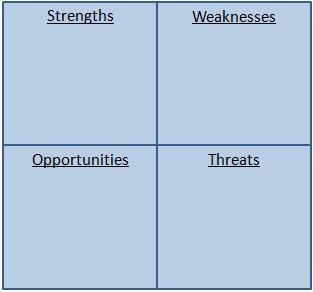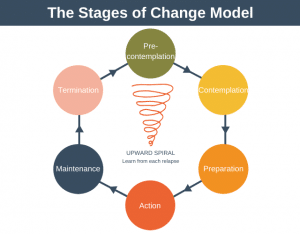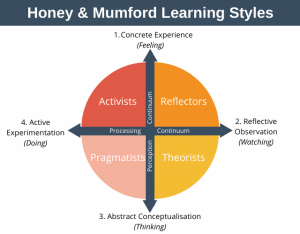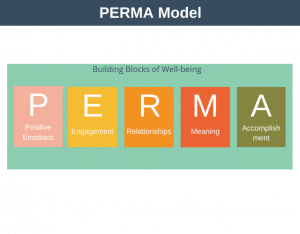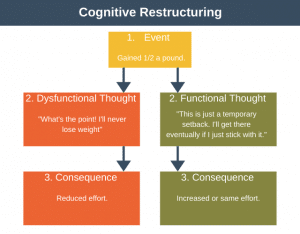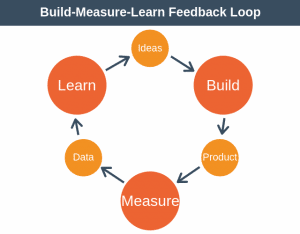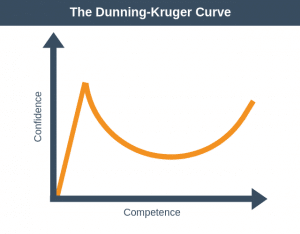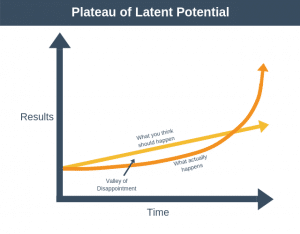SWOT Analysis is a key tool businesses use when performing strategic planning, assisting them in developing their strategy and future direction. From a business perspective, the real advantage of performing a SWOT analysis is that it helps discover new opportunities which actually play to the businesses’ strengths.
In the same way that businesses use SWOT analysis to determine their future course, a personal SWOT analysis can be performed as a career development exercise. The advantage of a personal SWOT analysis is that it allows us to identify new career opportunities we wouldn’t otherwise have discovered. It also allows us to see these opportunities in light of our strengths and weaknesses, so that we can pick the opportunity that is right for us, whilst taking action to limit any potential problems.
The SWOT Matrix
SWOT is an acronym representing Strengths, Weaknesses, Opportunities, and Threats. Strengths and weaknesses are internal characteristics which are personal to you, whereas opportunities and threats are external factors relating to your working environment and industry. You will typically see a SWOT matrix drawn as follows:
To assist you in creating your own personal SWOT assessment, below you’ll find some useful questions to ask yourself to help you complete each section of the matrix. When answering these questions try to compare yourself to those people around you such as your collegues, rather than against people in general. This will make your answers more objective and applicable to your actual career.
Strengths
- What know-how do you have that others don’t?
- What are you particularly good at?
- What contacts do you have in your professional network that others don’t?
- What would your colleagues say are your strengths?
- What behaviors or beliefs to you exhibit that stand you apart from others?
- Which of your achievements makes you most proud?
- Do you have any qualifications or training that differentiates you?
Weaknesses
- What part of your job do you dislike?
- What are your bad work-related habits? For example, are you often late to meetings or do you forget to take meeting minutes?
- What would your colleagues say are your weaknesses?
- Do you go out of your way to avoid certain aspects of your job?
- What do your colleagues do better than you?
- Are their any gaps in your education or experience?
Opportunities
- What are the trends in your company, your industry, or even the location in which you work? How could you use these trends to your advantage?
- Can you get access to tools or information that can help you in your role, or help you to get to the next role?
- Is your company missing an opportunity that your competitors aren’t? Can you make this change happen?
- Is there a problem or gap in the company that you could fill? For example, if there is unclear communication or a bad relationship between your department and the next, can you take it upon yourself to fix it?
- Can you leverage your professional contacts?
- How can you take advantage of what’s going on in your company right now? For example, if your company is making an acquisition and you have previously managed an acquisition there is a clear opportunity, or perhaps you speak a second language that might be useful?
This entire section could be summed up as keeping your eyes and ears open to what is going on around you, in your team, in your business, with your competitors, in other businesses, and in your industry, and constantly trying to find opportunities based on these observations.
Threats
- Which colleagues compete with you for the next promotion?
- Could technology render your position obsolete?
- Could trends, such as offshoring, render your position redundant?
- What barriers are preventing you from getting to the next step in your career and can these be overcome?
A Personal SWOT Example
Take the time to perform your own SWOT analysis. What opportunities might it unearth for you? Here is an example personal SWOT analysis for Winston, a fictional team leader.
Strengths
- I’m excellent at analyzing problems and deciding the way forward.
- I have a good academic background.
- I’ve travelled extensively and so have a good understanding and empathy for different cultures.
- I have excellent working relationships with my colleagues.
- I have a better understanding of my company’s competitors than my colleagues.
Weaknesses
- When I get stressed, I tend not to analyse all the options before making a decision and “jump right in” to what feels right.
- I tend to be stubborn and unwilling to change my mind once I have made a decision.
Opportunities
- My company is expanding its product range to target a new demographic.
- My company’s largest client has been complaining about the poor service they have been receiving recently.
- My company has recently expanded overseas but the overseas division has consistently missed it’s deadlines and failed to meet its targets.
Threats
- Despite being great at problem solving I’m often very busy which doesn’t give me any time to do what I’m good at.
- My company’s number one competitor is growing rapidly and we’re in danger of losing market share, despite the market growing overall.
Having performed his personal SWOT analysis, Winston decides to pitch to senior management that he should be sent to the overseas division to resolve their processes, as this is what he’s good at and he already has experience of their culture, so has a good chance of making progress where others have failed. To Winston’s surprise, senior management agree to send him to the overseas division for 12 weeks to fix their processes. Senior management had been aware of the problems overseas, but had not yet identified a solution. They can see that Winston would be a good fit, and are delighted he has offered to try solve this difficult problem for them.
Summary
Businesses perform SWOT analysis as part of strategic planning, but they can also be performed as a career development exercise. A personal SWOT analysis allows us to find opportunities that we would not have discovered otherwise. By performing a personal SWOT analysis regularly we can find ideas to move our career forward even though it appears we’re stuck in a rut. A regular personal SWOT analysis also allows us to keep our weaknesses and threats in check.
